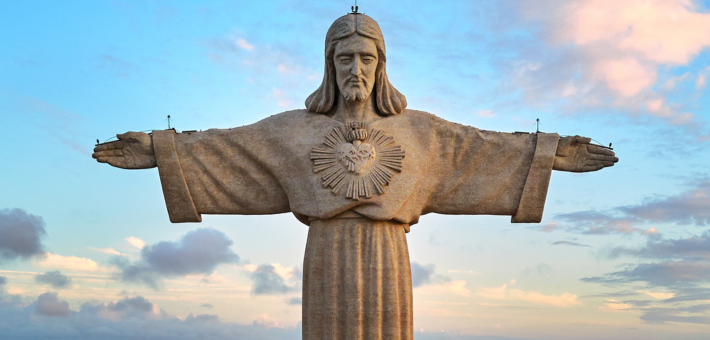Commentary on Colossians 1:11-20
[Note: This will address 1:1-20.]
Colossians is a beautiful tribute to the cosmic, triumphant Christ. It is both transcendentally inspirational and eminently practical. Unfortunately, scholars often treat Colossians as “deutero-Pauline” (or pseudonymous), and thus it gets neglected in Pauline studies. But many preachers will know that it is a magisterial letter with so much to offer in terms of worship, doctrine, and a life lived in faith, hope, and love.
A prison letter
If there is one thing most Christians will know about this text, it is that Paul was in prison (4:18: “remember my chains”). This was not an uncommon experience for Paul (2 Corinthians 6:5). He was not ashamed of it, because he knew he would face hardships as a devoted servant of Christ. But he also knew he was not alone (Colossians 4:10), and his spirit was buoyed by the affection and prayers of many (4:2-3; see also Philippians 1:19).
St. John Chrysostom argued that the prison letters were the most precious of Paul’s writings, because the weight of his chains clarified his faith and convictions and what was worth suffering for, worth dying for; Chrysostom wrote: “Oh! Those blessed bonds! Oh! Those blessed hands which that chain adorned!”1 Colossians is all the more valuable because Paul went to great pains to encourage a church facing significant challenges.
False teaching (also known as The “Colossian Heresy”)
Speaking of challenges, we learn from the letter itself that one of the reasons Paul wrote to the Colossians was to repudiate a false teaching, sometimes called the “Colossian Heresy” (see Colossians 2:4, 8–9). While scholars disagree about the exact nature and origins of this false teaching, I have come to describe it as a “transcendent-ascetic philosophy.” These other teachers were trying to convince the Colossian Christians that true heavenly wisdom and spiritual perfection can only be reached by elevating oneself above the body and material realm and, in fact, that only by subjugating the weak body can we be truly free from the hegemony of troublesome spirits and powers.
Paul’s letter was responding to this by redirecting their interest in wisdom and knowledge toward Christ, who is the “fullness” of God, and by asserting that our fulfillment is found in Christ.
Combating heresies with thanksgiving
Ancient theological heresies often operate like modern-day conspiracy theories: They utilize fear to move people to act. Apparently, the Colossian Heresy amplified fears about harmful spiritual powers and entities in order to inspire the Colossian believers to adopt this transcendent-ascetic philosophy. Paul begins to counter this from the start of his letter by dwelling on what is good and true right here and now: We can give thanks to God the Father and the Lord Jesus Christ because of a secure hope that is reserved for us in the end (1:3), for the grace of God received in the gospel (1:4–6), and for a community of love and care in the church (1:7).
Paul spends ample time, in this passage and throughout the letter, underscoring the future inheritance awaiting Jesus’ people (1:9, 12). Keep in mind, for ancient people, being an heir was not primarily about receiving money; it was about the honor and security that is experienced by being part of a family. Believers can thank the Father because the Son has redeemed us from darkness and relocated us safely and permanently into his royal family (1:13–14). Paul’s tone throughout is victorious jubilation—worry less, celebrate more!
The Cosmic Christ Hymn
Colossians 1:15–20 is one of the most beautifully articulated tributes to Christ in the New Testament. Some scholars think it is pre-Pauline liturgy; some (like me) think Paul probably wrote it himself. Some think it is a hymn or poem; some don’t. What is most obvious is that Christ is honored as God’s most glorious agent and the one most deserving of our worship. It was determined by God that “he might come to have first place in everything” (1:18c).
The part I want to draw the most attention to is the ending (1:20). If the Colossians were convinced by the false teaching that they needed to “transcend” this body and this earth and experience spiritual heights, they would undoubtedly be interested in a cosmic, glorified Christ. But Paul connects the supremacy of Christ with Christ’s gritty work on earth by mentioning how reconciliation was achieved by “making peace through the blood of his cross” (1:20). Blood and cross. These things are not “otherworldly” at all; these are symbols of death and degradation. Paul was reminding the Colossians that while we may sometimes think greatness lies in achieving “higher heights,” Christ proved his true greatness in the depths of his descent to humbly save sinful humanity, to die in loving service for us.
Tips for preaching on Colossians 1:1–20
#1: Don’t be afraid to get “spiritual.” Sometimes preachers try to “demythologize” the Bible to make it more palatable or interesting to “modern-day man.” But I think most people today are open to and interested in “spiritual things.” Colossians has so much to say about how we think about spiritual powers and what goes on in the invisible realm all around us. Lean in, don’t shy away. Christians believe in a triune God, angels and demons, principalities and powers, good and evil forces. There are healthy and unhealthy ways to talk about these things, but it does no one any good to ignore these topics.
#2: Emphasize the things we know for certain: faith and love in Christ. There is so much that we (preachers) don’t fully understand about angels and demons, heaven and hell, things long past and things to come. Don’t spend 90 percent of your sermon time on speculation. Focus on what we know for sure: We are called to grow in faith in Christ and in love for each other (1:3–6).
#3: Point to Jesus Christ. I know that sounds obvious, and even cliché, but that is what the Cosmic Christ Hymn (1:15–20) is all about—recognition of Jesus as God’s supreme agent of creation, sustainer of life, head of the church, trailblazer of the resurrection life, bursting with the fullness of God, and the one who shed his blood on a Roman cross to make peace with those who made themselves enemies of God.
#4: Talk about the physical body. There will always be a temptation to reject the physical body and escape to another world—we often do this today through our phones and other devices. The Colossians may have wanted to live in the clouds; are we any wiser trying to live in “the (digital) cloud”? The Cosmic Christ Hymn underscores the importance of Christ’s incarnation, his moving down toward us and living in a body. Henri Nouwen offers a helpful reminder of why we need a healthy theology of the body.
The greatest mystery of the Christian faith is that God came to us in the body, suffered with us in the body, rose in the body, and gave us his body as food. No religion takes the body as seriously as the Christian religion. The body is not seen as the enemy or as a prison of the Spirit, but celebrated as the Spirit’s temple. Through Jesus’ birth, life, death, and resurrection, the human body has become part of the life of God.
It is in union with the body of Christ that I come to know the full significance of my own body. … It is a home where God wants to manifest the fullness of the divine glory. … I wonder how I can bring this good news to the many people for whom their body is little more than an unlimited source of pleasure or an unceasing source of pain. The feast of the Body of Christ is given to us to fully recognize the mystery of the body and to help us find ways to live reverently and joyfully in the body in expectation of the risen life with God.2
In a world today of so many distractions, so many “self-help” philosophies and “life hack” fixes, a sermon on Colossians 1:1–20 offers the clarifying opportunity to give the people of God just one thing to focus their attention on: Christ, the incarnate and beloved Son, who gave his blood on a cross to generously offer to us joy-filled resurrection life, in the most complete way in the Eschaton, but in a very real way as well here and now.
Recommended resources
Gupta, Nijay K. Colossians. Smyth & Helwys Bible Commentary. Macon, GA: Helwys, 2013.
Notes
- “Homily 8 on Ephesians,” New Advent, accessed October 10, 2025, https://www.newadvent.org/fathers/230108.htm#:~:text=Oh!%20Those%20blessed%20bonds!%20Oh!%20Those%20blessed%20hands%20which%20that%20chain%2modern-day0adorned!.
- In The Essential Henri Nouwen, ed. R. A. Jonas (Random House, 2009), 21–22.


November 23, 2025